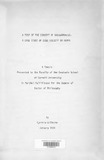| dc.description.abstract | The concept of backwardness is explored in both its theoretical
dimensions and its empirical applications to Digo society in
Kenya. As an idea, backwardness is shown to be associated with the
historical development of Western notions of progress and change
which have produced a dichotomy between tradition and modernity.
As a condition, backwardness is identified in a number of theoretical
models which variously locate the sources of backwardness in
history, natural laws, and tradition. It is shown that there is
a predominant tendency to link tradition and backwardness with
resistance to change in these models.
In separate chapters, the role of history and tradition are
explored as potential explanations for the image of Digo backwardness
followed by an analysis of the Digo economy and a discussion
of Kenya's rural development policies as expressed in the Swynnerton
Plan and the Special Rural Development Program. It is argued
that the role of history lies in the structure and quality of intergroup
relations as much as in culture contact, diffusion and external
events. The role of tradition, discussed in terms of Digo
cultural values and attitudes as well as structural features that | en |

